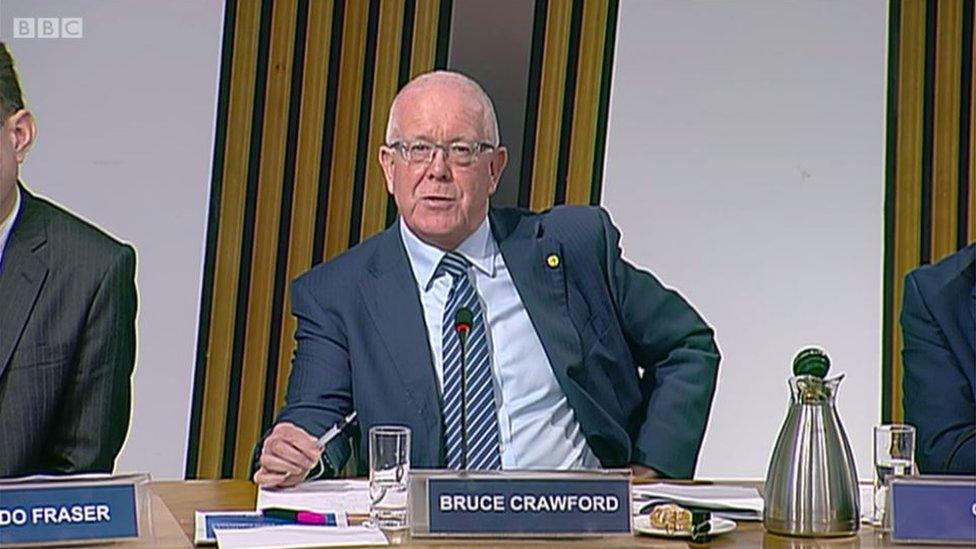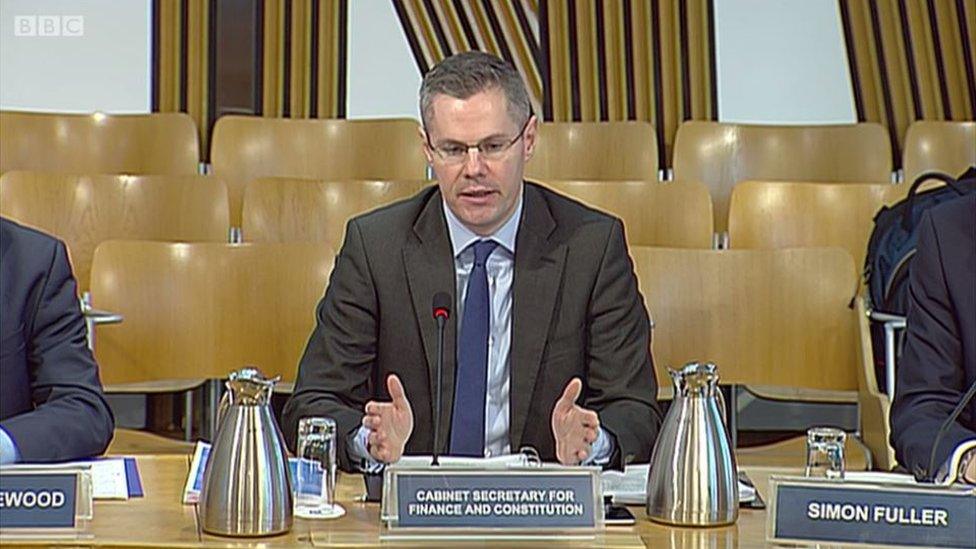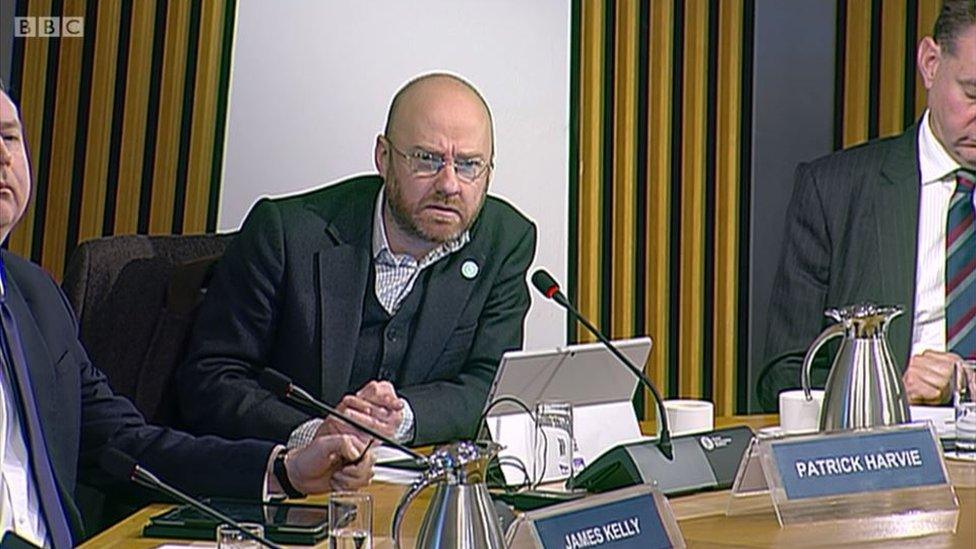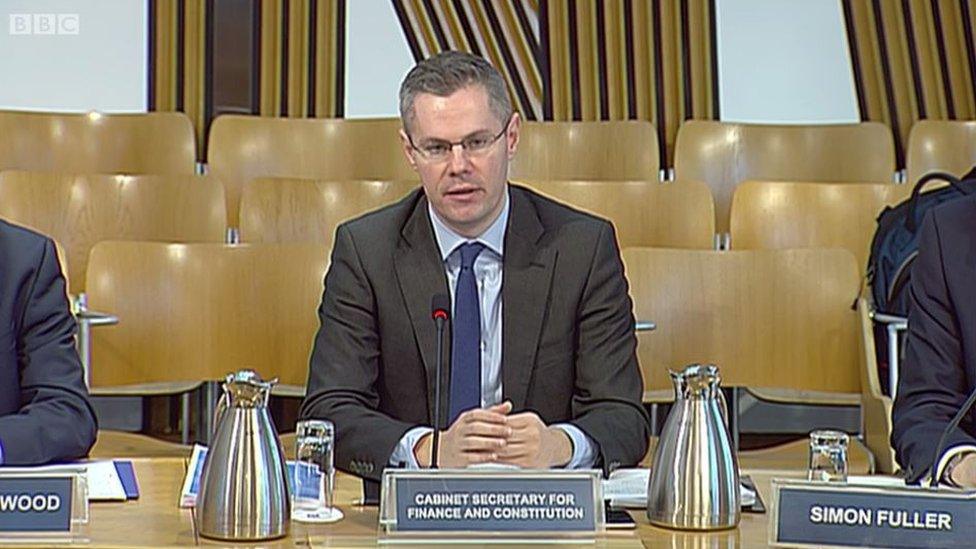Talking tax and budget bargaining at Holyrood
- Published

Bruce Crawford said the meeting was a historic one
One should always pay heed to Bruce Crawford. As a self-confessed supporter of Dunfermline FC, he has known pain - and has thus developed a stoical weltanschauung which informs his outlook on football and more trivial matters like politics and life.
And so when Mr Crawford, convening Holyrood's finance committee, said that the evidence session about to get under way was a "historic" event, such a comment deserves respect.
Indeed, he went further. He informed Derek Mackay, the finance secretary, that his role represented "a privilege" in that he was in command of the first Holyrood budget with full income tax powers.
The privileged Mr Mackay looked shyly impressed - although both his demeanour and his spoken contribution reflected another element. That his command is somewhat limited.
Mr Crawford had, himself, reflected upon that fact when taking evidence, earlier, from Robert Chote of the Office for Budget Responsibility. The convener told the cheerful Mr Chote that the big question surrounding the Scottish budget was "whether it can be achieved."
Sharp debate
Hence Mr Mackay's understated approach. He lacks a majority at Holyrood. Admittedly, the SNP squadron only just falls short.
But margin matters. Just ask Crawford, B, who was the business manager in the Scottish government during the last minority period from 2007 to 2011.
That absence of a majority hung over the committee session, like a looming sprite. It led to a curiously mixed tone among members: solemn, sharp debate together with mischievous interchange.

The mischief came mostly from Murdo Fraser of the Tories. He teased the minister rather successfully by, quite consciously, eliding the difference between DEL (that's discretionary spending, controlled by Mr Mackay) and TME (that's total managed expenditure, including elements like pensions over which the minister has no control).
But Mr Fraser had serious points too. He complained that the SG tax package will leave higher earning Scots paying more than their counterparts south of the border.
For Labour, James Kelly took the opposite point of view. He said the SG had "shied clear" of increasing taxation, resulting in cuts to local government expenditure.
Mr Mackay, coolly and solemnly, sought to rebut both. He told Mr Fraser that his tax package was balanced and he told Mr Kelly that the cash available for local services was fair. But perhaps the sharpest and most prolonged exchange came when Patrick Harvie of the Greens intervened.
Budget deals
Why so? That looming sprite again. Mr Mackay knows that there is very, very little chance of either Labour or the Conservatives striking a deal with him to enable the budget to proceed.
The Tories have just gained votes and seats by vaunting the Union and thus placing themselves in direct contradistinction to the SNP. They are not about to abandon that by working with the SNP over the budget.
And Labour? They had a bad Holyrood election and fear that the local elections in May will offer little for them in the way of uplift. Their pitch will be that SNP plans threaten council cash. The SNP will rebut, as Mr Mackay did today, to the effect that local services more generally have been protected.
Which leaves the Greens and the Liberal Democrats. The Lib Dems don't have a presence on the committee so it was up to Mr Harvie.

Patrick Harvie was very vigorous in his questioning of Mr Mackay
Intriguingly, the Green co-convener pursued the topic of tax very vigorously indeed. Mr Mackay has indicated that he is less than minded to give ground on his tax package which he regards as carefully calibrated, balancing concerns and interests.
From first principles, Mr Harvie seems unwilling to concede that. He wants to rebalance the tax proposals to make the relatively wealthy pay more. In short, he wants elements of his own manifesto project to be adopted.
Mr Harvie knows that there will be a separate vote on tax at Holyrood - before the stage three final vote on the budget. That is why he is pushing so hard now for concessions on tax and not just spending.
At which point, ministers protest. Large parties, they say, have rights too. The SNP may not have won an overall majority but they palpably won the election - in a contest which featured the tax debate very prominently.
Substantial difficulties
Plus there is another element. The SNP has a collective memory of that coalition parliament - in particular of the occasion when John Swinney thought he had a budget deal with the Greens, only to watch it vanish at the last moment. There is, frankly, a degree of distrust.
The Lib Dems then? Maybe. But they have substantial difficulties too. They proposed an increase in the standard rate of tax - specifically to bolster education spending.
Those local elections loom. Elections in which the Lib Dems will be defending seats across Scotland. They do not want to endorse the SNP budget if they end up under attack over "council cuts".
To be clear, all parties at Holyrood are engaging seriously and thoroughly in negotiations. In particular, both the Greens and the Lib Dems have now submitted what amount to shopping lists to Mr Mackay. The Lib Dems, for example, are looking for action on mental health.
Do I expect the talks to succeed? I do. That is because the alternative is bringing down the Scottish government and prompting a further election. Voters tend to dislike unnecessary elections and might be inclined to punish the party they perceive as responsible for forcing such a development.
- Published11 January 2017
